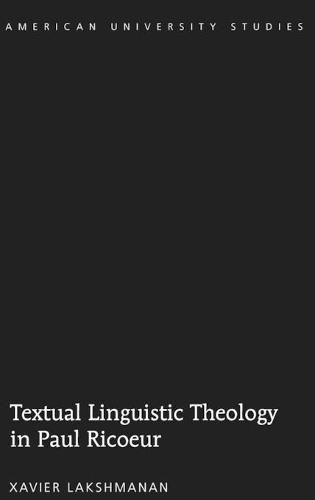Readings Newsletter
Become a Readings Member to make your shopping experience even easier.
Sign in or sign up for free!
You’re not far away from qualifying for FREE standard shipping within Australia
You’ve qualified for FREE standard shipping within Australia
The cart is loading…






This title is printed to order. This book may have been self-published. If so, we cannot guarantee the quality of the content. In the main most books will have gone through the editing process however some may not. We therefore suggest that you be aware of this before ordering this book. If in doubt check either the author or publisher’s details as we are unable to accept any returns unless they are faulty. Please contact us if you have any questions.
In this work, Xavier Lakshmanan argues for a textual linguistic approach to Christian theology. The book takes its shape in conversation with Paul Ricoeur’s philosophical thought, demonstrating how Ricoeur’s hermeneutic philosophy can inform the way Christians interpret and appropriate biblical narratives without delimiting the potential of the text or eroding the distinctiveness of its language. The text can be appropriated in ways that address the fundamental questions of life. New meanings are constantly generated from the same text in order to describe and redescribe existence, and form human identity. The self is linked inseparably with narrative; every interpretation of narrative is at the same time a reinterpretation of the self and of its possibilities. In such interpretative processes, the reader interprets the text and the text interprets the reader at the same time through an interactive reading. Accordingly, the aim of interpreting the narratives is to open up the world of the text in front of the text and in front of the reader. Here what the text uncovers is the textual structure of existence itself. The reality that unfolds through language discloses the possibilities of existence, and in this way the text creates a future. A revised identity emerges against the horizon of that future to give a coherent and dynamic account of the self against a horizon of hope.
$9.00 standard shipping within Australia
FREE standard shipping within Australia for orders over $100.00
Express & International shipping calculated at checkout
Stock availability can be subject to change without notice. We recommend calling the shop or contacting our online team to check availability of low stock items. Please see our Shopping Online page for more details.
This title is printed to order. This book may have been self-published. If so, we cannot guarantee the quality of the content. In the main most books will have gone through the editing process however some may not. We therefore suggest that you be aware of this before ordering this book. If in doubt check either the author or publisher’s details as we are unable to accept any returns unless they are faulty. Please contact us if you have any questions.
In this work, Xavier Lakshmanan argues for a textual linguistic approach to Christian theology. The book takes its shape in conversation with Paul Ricoeur’s philosophical thought, demonstrating how Ricoeur’s hermeneutic philosophy can inform the way Christians interpret and appropriate biblical narratives without delimiting the potential of the text or eroding the distinctiveness of its language. The text can be appropriated in ways that address the fundamental questions of life. New meanings are constantly generated from the same text in order to describe and redescribe existence, and form human identity. The self is linked inseparably with narrative; every interpretation of narrative is at the same time a reinterpretation of the self and of its possibilities. In such interpretative processes, the reader interprets the text and the text interprets the reader at the same time through an interactive reading. Accordingly, the aim of interpreting the narratives is to open up the world of the text in front of the text and in front of the reader. Here what the text uncovers is the textual structure of existence itself. The reality that unfolds through language discloses the possibilities of existence, and in this way the text creates a future. A revised identity emerges against the horizon of that future to give a coherent and dynamic account of the self against a horizon of hope.